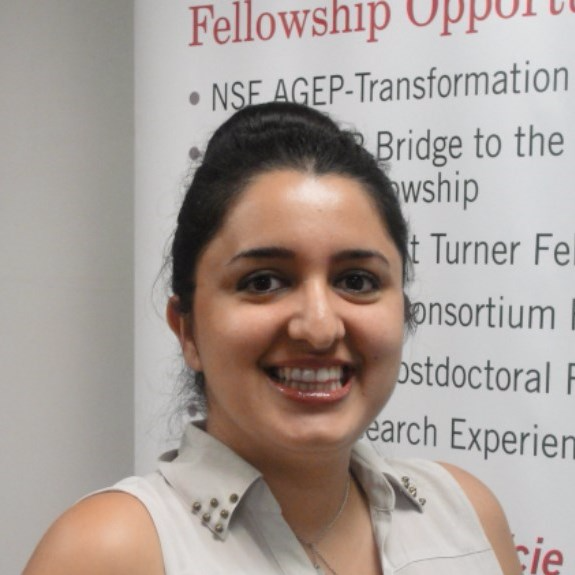CIE Researcher of Distinction, September 2014
Diana Guimet
Each month, the Center for Inclusive Education showcases the outstanding research being conducted by one of our talented scholars in our Research Cafe series. In addition, we recognize this scholar as a Researcher of Distinction and share the details of their journey to becoming an accomplished scholar. This month's Researcher of Distinction is Diana Guimet, Ph.D. candidate in the Molecular Genetics and Microbiology Graduate Program. Diana presented her talk, "The Adenovirus L4-22K Protein has Distinct Functions in Post-transcriptional Regulation of Gene Expression and Encapsidation of the Viral Genome" on Wednesday, September 10, 2014.
Diana's Path Into Research
I was born in Colombia and moved to the United States when I was 8 years old. I grew up in San Diego, California, but my parents raised me with a strong cultural connection to my Hispanic background. I attended at El Camino High School, where I worked very hard academically and took as many advanced placement and college level classes as possible. Unfortunately this did not leave me much time for extracurricular activities. I should however admit I played the clarinet in my high school marching band through my junior year and enjoyed it.
I applied to many Universities, and the University of San Diego (USD) offered me the Presidential Undergraduate Merit Scholarship for Academics granting a full scholarship, all expenses paid for my undergraduate studies. As an undergraduate student, I was interested in marine biology, but during one of the required trips out to sea on a research vessel, I discovered that I suffered from horrible sea-sickness and changed my major to general Biology. While I was at USD, I was part of the Honors program, where I had the opportunity to work on an undergraduate research project for two years. The project was in conjunction with Hubbs-Seaworld Research Institute and focused on Sheephead aquaculture. I was very interested in research, but still was not sure what career path I wanted to take. After college, I worked for the Genomics Institute of the Novartis Research Foundation as a technician in the Compound Management Department. My work included management, processing, and testing of drug discovery compounds for various projects including High Throughput Screening and Cancer Cell Line profiles.
Diana's Current Research
Describe the work you will be presenting for your Research Café.
Adenovirus (Ad) infection is generally associated with mild respiratory, gastrointestinal diseases, or ocular diseases, but recently, Ad has been recognized as an important pathogen in immunocompromised individuals. Importantly, recombinant Ad vectors are being utilized in ~25% of current human gene therapy trials. There is no virus-specific therapy for Ad infection and there is much to learn about the basic biology of Ads to construct engineered viruses for targeted therapies. Therefore, it has become increasingly important to understand the molecular mechanisms of the viral life cycle. My research focuses on the L4-22K virus encoded protein of human Ad5 serotype. Since L4-22K serves as the master regulator to coordinate late gene expression and is essential for Ad genome encapsidation, this protein may serve as a useful target for antiviral therapy.
Are there any other projects that you are currently working on?
At the moment, I am focusing on wrapping up my thesis project and writing my dissertation. At the beginning of my thesis I did work briefly on a gene therapy- specific project trying to understand why the propagation of engineered viruses for gene therapy was so inefficient. The findings did not give us any solid data to publish in a peer-reviewed journal, but will make for a great appendix in my dissertation.
What was the deciding factor for you to come to Stony Brook for your graduate studies?
Since I stayed so close to home for undergrad, I decided I wanted to move to the East Coast, even if it was temporary, for graduate school. Out of all the graduate schools that I applied to, and got accepted to, Stony Brook had the best program in the field of Genetics and Microbiology. The ultimate factor was the SUNY Doctoral Fellowship in Science, Technology, Engineering, and Mathematics that was offered to me from SUNY Buffalo, but Stony Brook was able to transfer the scholarship over and this made my decision final.
What are your future goals?
Although I have enjoyed the past 5-1/2 years in New York, I miss home. I miss my family, my friends, and beautiful San Diego. I also want my daughter to grow up close to her aunts, uncles, and grandparents. When I graduate, I plan on moving back to the San Diego area. My ultimate goal is to work for a research-focused biotech company, but I am open to a postdoctoral position in academia before that. Ask me again in a few months when I have found a job.
What do you enjoy most about research?
Besides the excitement of unpredictability of research, I really enjoy the freedom of making my own schedule, and essentially planning my own day-to-day activities. I have the independence of doing what I love most, in conjunction with the amazing guidance and mentorship from my advisor.
